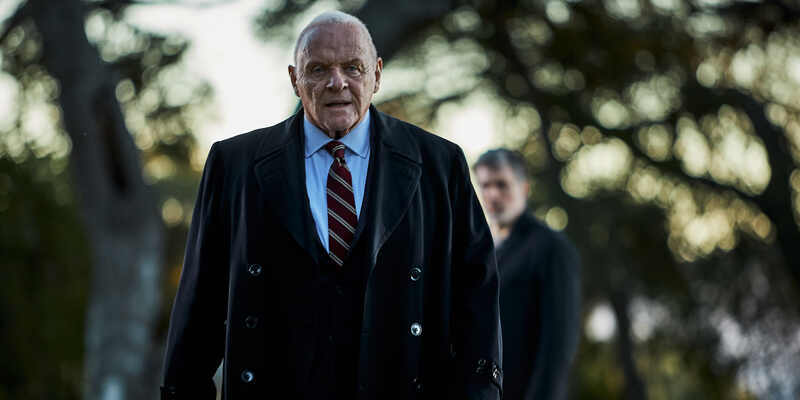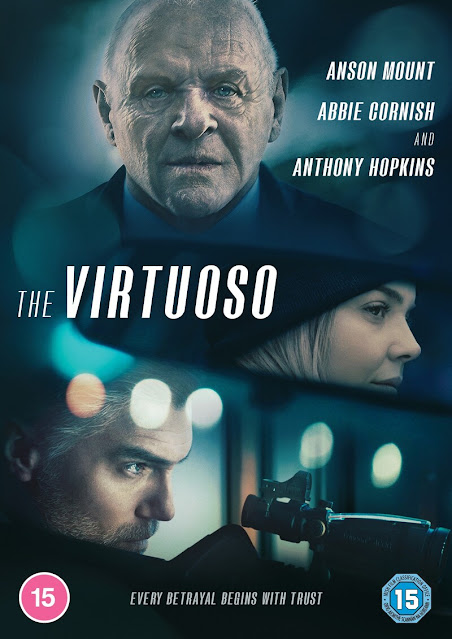
In director Nick Stagliano's The Virtuoso, danger, deception, and murder descend upon a sleepy country town when a
professional assassin (Anson Mount) accepts a new assignment from his
enigmatic mentor (Anthony Hopkins).
Given only a time, a location, and a cryptic clue, the methodical hit man
must identify his mysterious foe from among several possible targets,
including a local sheriff (David Morse). Meanwhile, a chance
encounter with an alluring woman (Abbie Cornish) at the town’s rustic
diner threatens to derail his mission altogether...

Hey Nick, without spoiling anything, what's your new film,
The Virtuoso, about?
In any given profession, there are some unique individuals who rise above
their peers. They master their craft, perfect it, and perform flawlessly,
be they an artist, a musician, or even… a professional assassin. One such
example of the latter is a consummate and gifted talent, who in the course
of his ‘distinguished’ career, has earned the sobriquet of 'The Virtuoso'
(Anson Mount).
He is a man who has never faltered in the execution of his duties. He
questions no assignment, makes no judgment about his target. His planning
is meticulous and he has never experienced anything less than perfection
in the results of his work. Until recently…
Called upon by one of the few men he trusts, known only as 'The Mentor'
(Anthony Hopkins), The Virtuoso had been asked to take on a new job with
precious little time to prepare, and very specific requirements to be met
in the way in which the target had to be ‘removed.’ However, on this one
occasion, The Virtuoso’s efforts resulted in something that wasn’t part of
the plan. Something the assassin had never experienced in his long years
as an independent contractor…collateral damage. It shouldn’t have
happened, despite the Mentor’s assurance that had there not been a hasty
timeline imposed, the unfortunate incident would not have occurred.
Determined to put this episode behind him, the Virtuoso accepts the very
next directive for which he is contacted. To his frustration, the details
of this job are even more scarce and ambiguous than that of the previous
one. He’s given no name or photo, only that his target will be present in
a rustic diner in a dying town at 5:00 PM. Bound by obligation, The
Virtuoso embarks on a manhunt to identify his prey and eliminate them,
testing the limits of his skills.
Any one of the patrons of the diner could be the mark, even the enigmatic
waitress (Abbie Cornish) who, even if she’s his target, could prove to be
a further distraction that threatens to derail his task and endanger his
life.
The Virtuoso is a modern day film noir, filled with
intricacy and ambiguity… a visceral thrill ride with something to say. It
contains everything I love in a movie. There is cinematic style to burn:
bold visuals, muted colours, strong performances, dynamic compositions and
Hitchcockian suspense mixed with Peckinpah violence. But it’s also filled
with compelling and unconventional characters. A clever and gripping story
told in an unorthodox manner. And a riveting plot filled with moral
dilemmas and heartbreaking realities.
On a deeper level, the film explores universal themes of identity, guilt
and redemption. It examines the fine line between appearance versus
reality and fate versus free will… and the horrific cost of them all. As
timely today as when the genre was at its peak in the late '40s and '50s,
I want The Virtuoso to be a cinematic hammer to the head and
the heart.
You've reteamed with screenwriter James Wolf, who penned your last
movie (2011's Good Day for It). Did you guys develop the
script together or did you come onboard after James had completed it?
I was looking at my previous film Good Day for It, which was similar in tone but with one specific twist – that film was a
“ticking clock” thriller in that our hero, long thought to be a “bad man”,
was in reality a good man who did bad things when he was younger. Coming
to a small diner to meet the daughter he left behind, we realise that he
is actually a good man, and the circumstances of the plot, with a twist of
fate, force him to confront the real bad men that he ran away from all
those years ago. I personally love those ticking clock, pressure cooker
set ups – when we all know that time is against our hero and something
must happen before time runs out.
So with The Virtuoso, I thought – what if our hero was actually a bad man, who makes a
mistake, and starts to become “good”? Fascinated by the impact of guilt on
us human beings, I wanted to create a slightly different version of
GDFI here, so that a likable, handsome hero, who is actually
a bad man, can be affected when guilt/conscience/compassion/emotion, start
to infect his being.
James and I had worked together on GDFI, which was based on my original idea. We had met at a film festival
years before that and I knew that he was good with breaking down the three
act script and research and had a strong idea of classic story structure.
With that, I told him the idea of The Virtuoso and then sent
notes to work into a first draft. Once that was finished, I started to
take it out as the producer but always had it in my mind as a project for
me to direct, since it had originated from me and was related to my
previous film.
Getting Anthony Hopkins to star in your movie is a big deal in itself,
but you must be delighted that he just won the Oscar the same week as
your movie goes on release?
I am very happy for Tony and the team behind The Father. Well-deserved and couldn’t happen to a nicer guy, who genuinely does
not care about the awards and accolades, but is happy simply doing the
great work. On a personal level, since we shared some very tense moments
in the cemetery scene and breaking down his character of The Mentor, I am
absolutely thrilled that the Academy has honoured him with the Oscar.
On a professional level, since I am also the producer of the film, the
timing was perfect to help us launch The Virtuoso. Also, any fans of Sir Anthony will have a great time seeing a legendary
actor at the peak of his craft in back to back performances where his
characters could not be any further apart in their emotional and physical
construct.
I imagine working with an actor of Hopkins' calibre and experience can
only be beneficial for a director. What did he bring to the film?
Sir Anthony Hopkins – happy to say I can now call him “Tony”. Really
nothing surprising here, in that it was one of the great experiences of my
life to meet him, then direct him in this film. I thought that the role of
The Mentor needed and deserved an actor of his level (the highest), as
that was what always elevated this film above a simple action film.
I wrote the scene in the cemetery (which was not in the original script)
where The Mentor has a seven page soliloquy, and I was thinking of who
could pull this off and there were very few people on that list. When
Anson’s agency, UTA, came to us with a short list of men they represented,
Tony was on it, and though I never really thought I would get him, I also
thought I had to take that chance. But thankfully, the script read well to
him, and that cemetery scene especially touched him as he had similar
feelings of the impact of guilt and redemption on the human character. On
set and in person and on screen, the greatest experience. Very warm,
giving to crew and fellow cast, not pretentious at all, and very much the
“Tony” that he introduces himself as when he meets you.
On an even higher scale, an actor of his stature raises the level of
everyone working on the film. Almost an obligation for everyone involved
on the production to bring their best effort to set every day. Not that he
knew it or demanded it by word or action, but just by his presence, the
presence of greatness, that could be felt on set whenever Tony was there.
The hitman is a classic figure in the crime genre. Are there any
previous screen hitmen that inspired The Virtuoso?
Not really in that our lead character The Virtuoso is actually an
anti-hero and though he begins as the ultimate cool customer, he slowly
evolves into a human being. Possibly one that comes close might be Jean
Reno as “Leon” in
The Professional.
What's next for Nick Stagliano?
Working on several new projects including the crime thriller
99, the ensemble drama Nebraska Fish and Game, a romantic comedy set in Italy Heart of Marble, the suspense thriller Winter Blood and another noir
She Died Twice.
Finally, tell our readers why they should check out
The Virtuoso?
The Virtuoso observes the interaction of three symbolic
leads – The Virtuoso, The Waitress and The Mentor – who respectively
represent the tragic hero, the femme fatale and the deus ex machina of
classic drama. The Virtuoso is the strong, silent cowboy, a lost soul who
finds his calling ultimately through what he does best – kill people,
seeking to interpret the ambiguities of the world he encounters. The
Waitress is a good woman, just trying to get by in her rather bland
existence, searching for her ticket to a better life – or is she? And The
Mentor is that ever lurking power who lords over the world around him,
making life and death decisions with the blink of an eye.
I would like audiences, of course, to be entertained by the film, and to
be taken on a ride for which they do not know the ending, for as long as
possible. While the style of the film is film noir, filled with themes of
death, and despair, and decay and the blue tint of coldness, the overall
and underlying theme is universal – a love story, which just happens to be
about bad people, doing very bad things! But what I hope will really make
us think after we leave the theatre is this – the impact of guilt infects
your soul and continues to grow inside and must be dealt with before it
can destroy you.
Filled with jaw-dropping violence, nail-biting suspense and dazzling
style… anguished, beautiful and desperately alive. Plus, Sir Anthony
Hopkins!
The Virtuoso is on UK/ROI Digital Download now and DVD May
10th from Lionsgate.
